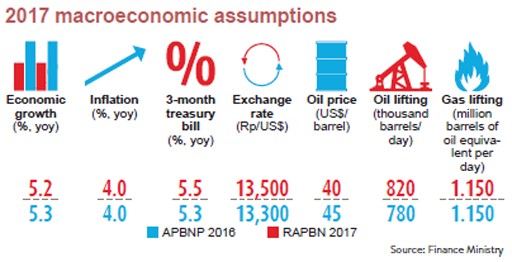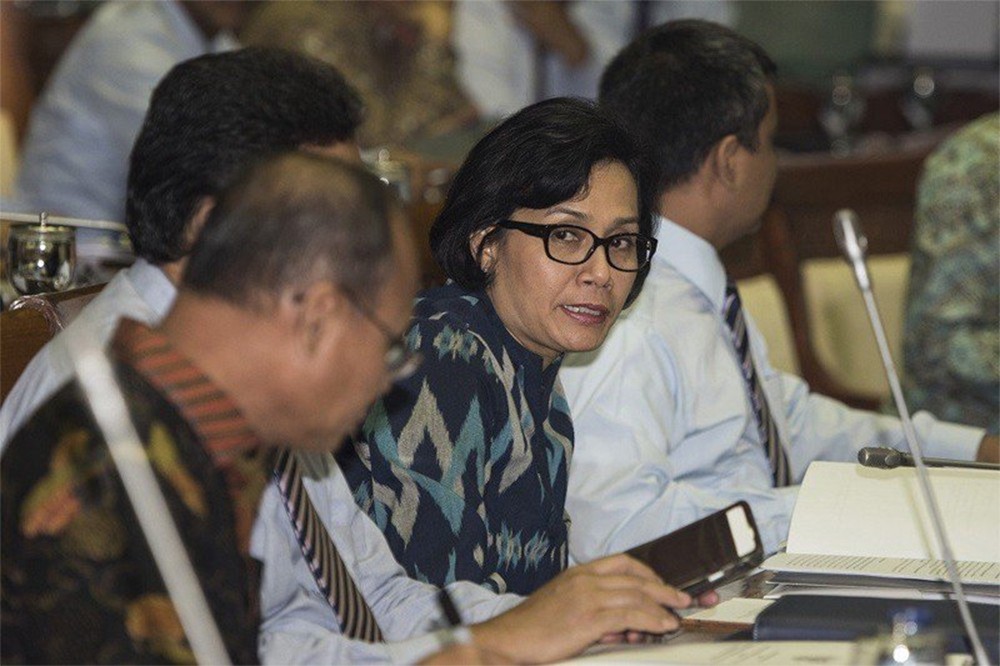Popular Reads
Top Results
Can't find what you're looking for?
View all search resultsPopular Reads
Top Results
Can't find what you're looking for?
View all search resultsGovt more realistic about growth
Change text size
Gift Premium Articles
to Anyone
The government has accepted that its economic growth target for 2017 was over-optimistic.
Finance Minister Sri Mulyani Indrawati told the House of Representatives’ Commission XI overseeing financial affairs last week that the economy would expand by 5.1 percent next year, lower than the 5.3 percent stated in the proposed 2017 state budget delivered by President Joko “Jokowi” Widodo last month.
Sri Mulyani, a former World Bank managing director, told lawmakers the government did not intend to repeat this year’s budgetary mistakes, which forced it to carry out two rounds of budget cuts amounting to nearly Rp 150 trillion (US$11.4 billion) in anticipation of a massive tax revenue shortfall of Rp 219 trillion.
“I feel more comfortable with 5.1 percent growth next year,” Sri Mulyani said. “Even if there is a revision next year, we hope it’s an upward one.”
It remains unclear how greatly the lower growth target next year will affect state revenues and, consequently spending, as the government is still dealing with this year’s quandary of overly ambitious tax targets and lower economic growth than expected.
The country had just begun to recover from a six-year low economic growth rate of 4.79 percent last year, with an earlier expectation of boosting growth to 5.3 percent in the 2016 state budget.
However, after two rounds of budget cuts, Sri Mulyani has settled for between 5 and 5.1 percent growth target for the year as a result of reduced government spending that could hinder its multiplier effect on the overall economy.
For next year, lawmakers’ forecasts of an even lower growth rate of 5.05 percent made it clear that they and the government will proceed with a gloomier outlook on the nation’s economy.
Sri Mulyani said trade would be the pull factor next year as sluggish global economic conditions would still linger on to result in weak worldwide demand, as reflected in the recent G20 meeting in Hangzhou, China.
The International Monetary Fund (IMF) has slashed its global economic growth forecast to 3.1 percent from 3.2 percent this year and to 3.2 percent from 3.3 percent next year.
 -(Finance Ministry/-)
-(Finance Ministry/-)
Indonesia should get used to seeing its growth relative to the global economic expansion, which currently faced abundant challenges, said Febrio Nathan Kacaribu, head of research for the macro-economy and trade of the University of Indonesia’s Institute for Economic and Social Research (LPEM-UI).
“Growing by 5.1 percent next year is already good, relative to global growth,” he said by phone on Monday.
Given the country’s large population of more than 240 million people, consumer spending would remain the engine of growth, Febrian added, apart from private investment, which could push growth higher.
The government expects that investment will expand by 6.1 percent annually next year, lower than its previous target of 6.4 percent as several business sectors, such as commodities, remain under pressure from the slowing global economy.
Meanwhile, domestic consumer spending growth, which makes up more than half of the GDP last year, is maintained at between 5 percent and 5.1 percent.
Deutsche Bank chief economist Taimur Baig called Indonesia’s large, relatively young, population the economy’s “blessing” in addition to its growing middle class and rich natural-resource base.
However, he went on, excessive optimism had held Indonesia back in recent years. This affliction manifested in yearning for 7 percent real GDP growth in 2019, expecting surging foreign direct investment despite nationalistic measures and feeling immune from global market volatility.
“This led to the government’s macroeconomic forecasts being repeatedly wrong, leading to questions about the coherence of the fiscal and monetary policy framework,” he wrote in a research note.
The more prudent and conservative the state budget is, the better it is, said Bank Central Asia (BCA) economist David Sumual.
“If the realization is better than our expectation that can be a bonus for us,” he said by phone on Monday, adding that the draft state budget was closely related to market confidence and faith in the country’s economy.










